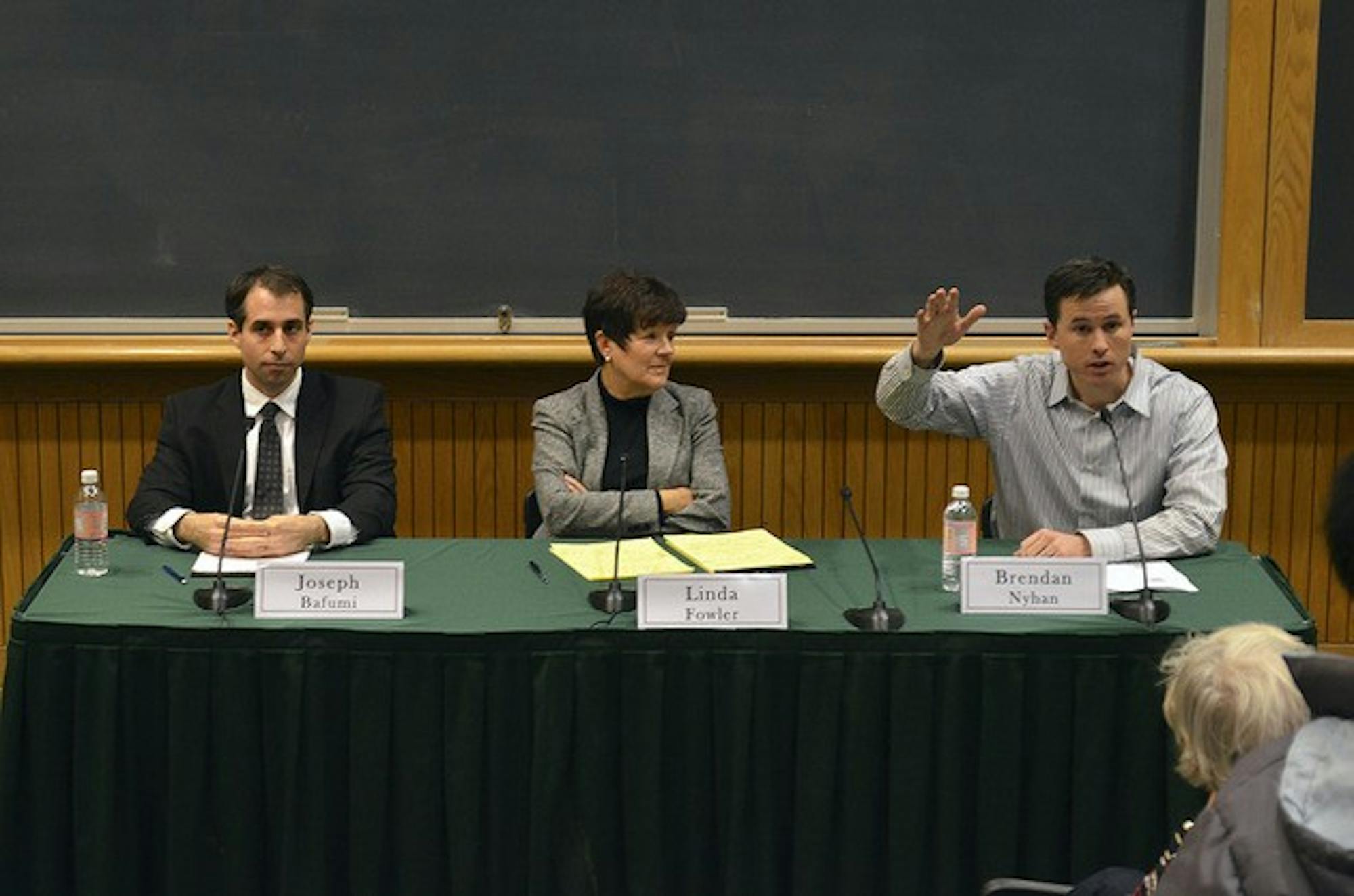Economics and public policy professor Charles Wheelan moderated the discussion between government professors Joseph Bafumi, Linda Fowler and Brendan Nyhan.
The 2012 election has not visibly changed the political landscape of the United States, according to Wheelan.
"The important stuff, the hard decisions relating to governance, are just beginning," he said.
Bafumi said the fiscal cliff a series of spending cuts and tax increases scheduled to go into effect on Jan. 1 is the most important political issue that Obama will encounter at the beginning of his second term. The current debt crisis exceeds previous crises due to fundamental structural issues within the budget, including the need to pay entitlements and the fact that American exports have decreased.
"Our current debt rivals our World War II debt levels," Bafumi said. "It's estimated that in 10 years, which isn't that long, servicing the debt will be the fourth most expensive obligation that we pay every year, after Social Security, Medicare and defense spending."
Politicians' unwillingness to pass bills that might alienate their political bases also prevent them from solving fiscal issues, Bafumi said. Democrats do not wish to decrease entitlement spending and Republicans are opposed to raising taxes, though both actions would be necessary to combat the current deficit.
"Essentially, we know how to bring the situation under control if we really wanted to," Bufami said. "No plan has gained support. Polarization has made that difficult."
Bafumi said he believes that Obama and Congress will not permit the Budget Control Act which has resulted in the fiscal cliff to expire. The act would lead to across-the-board spending cuts if a solution to the fiscal crisis is not reached by 2013.
Congress will most likely pass a bill to postpone these scheduled cuts, according to Bafumi.
Fowler said she does not think hitting the fiscal cliff would be as terrible as some believe it may be, noting that "you can't rewrite the tax code in a couple of weeks with a lame-duck Congress."
Nyhan also said that the fiscal cliff may not necessarily cause extreme problems.
"The policy would take a while to kick in," Nyman said. "If we cut a deal on Jan. 2 instead of Dec. 31, it would be messy but not a disaster."
In discussing the role of partisanship in the current political climate, Nyhan said that Congress has only recently returned to a system of excessive polarization.
"The Democrats in the South used to be, essentially, a third party," Nyman said. "That went away. A lot of our ideas of polarization are centered around this mythical golden age in the mid-20th century when we had three parties, but that's an aberration, not the norm."
Congress and the country as a whole are becoming less partisan. The loss of several prominent Tea Party politicians, including former Rep. Allen West, R-Fla., and former Rep. Joe Walsh, R-Ill., have contributed to this decrease in polarization, according to Fowler.
"The Tea Party movement is not a phenomenon that has expired, but it certainly does not have the same bite," Fowler said.
All three panelists said they do not think gerrymandering of congressional districts plays a role in increased partisanship.
Nyhan, Bafumi and Fowler also discussed the roles that super PACs and attempts at voter suppression played in the 2012 election, agreeing that neither had a major effect on the outcome.
Students in attendance said they appreciated the focus on economic matters like the fiscal cliff.
"It's a very serious issue that needs to be addressed," Mark Sheridan '15 said. "I've been following it pretty closely."
Marsha Frederick, a Hanover resident who attended the lecture, said she was surprised that Fowler said the fiscal cliff is not "as fearsome as it seems."
"I agreed with most of what they said," Frederick said. "They obviously know a lot more, factually, than I do."




